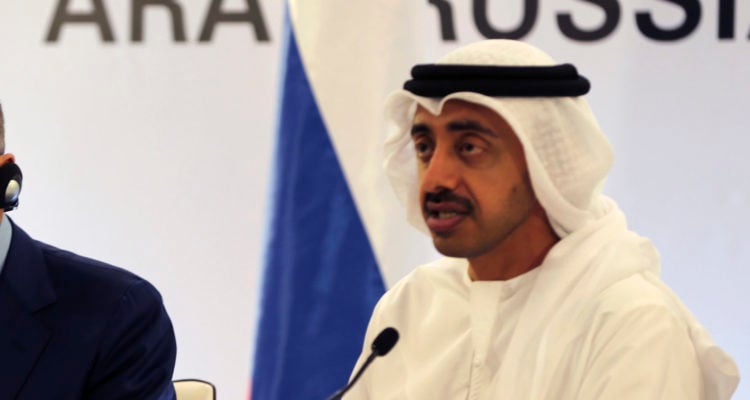The new Emirati law lays out “a road map toward launching joint cooperation, leading to bilateral relations by stimulating economic growth and promoting technological innovation.”
By Associated Press
The ruler of the United Arab Emirates issued a decree Saturday formally ending the country’s boycott of Israel amid a U.S.-brokered deal to normalize relations between the two countries.
The announcement now allows trade and commerce between the UAE, home to oil-rich Abu Dhabi and skyscraper-studded Dubai, and Israel, home to one of the world’s most successful tech start-up ecosystems.
The announcement further cements the August 13 deal opening up relations between the two nations.
The state-run WAM news agency said the decree formally ending the boycott came on the orders of Sheikh Khalifa bin Zayed Al Nahyan, the ruler of Abu Dhabi and the Emirates’ leader.
WAM said the new decree allows Israelis and Israeli firms to do business in the UAE, a U.S.-allied federation of seven sheikhdoms on the Arabian Peninsula. It also allows for the purchase and trade of Israeli goods.
“The new law comes within the UAE’s efforts to expand diplomatic and commercial cooperation with Israel,” WAM said.
It lays out “a road map toward launching joint cooperation, leading to bilateral relations by stimulating economic growth and promoting technological innovation.”
Israeli Prime Minister Benjamin Netanyahu welcomed the decree. “This is an important step toward advancing peace and prosperity in the region,” he said.
The decree formally eliminates a 1972 law on the UAE’s books since just after the country’s formation. That law mirrored the widely held stance by Arab nations at that time that recognition of Israel would only come after the Palestinians had an independent state of their own.
Hanan Ashrawi, a senior Palestinian official, criticized the UAE’s decree Saturday as undercutting the efforts of the Boycott, Divest and Sanctions movement, which seeks the elimination of Israel as a Jewish state.
“While (hashtag) BDS is proving to be an effective tool of peaceful resistance & responsible, ethical investment & consumer responsibility to hold Israel to account, this happens!” Ashrawi wrote on Twitter.
Hamas, the Islamic militant group governing the Gaza Strip since seizing it in 2007, has reiterated its rejection of the UAE-Israel deal and the ending of the boycott.
The decree “boosts the normalization with the Israeli occupation and legitimizes it on the Palestinian land,” Hamas official Bassem Naim said.
In recent years, the UAE has held quiet talks with Israel and allowed Israelis with second passports into the country for trade and talks. Opening ties may also help the Emirates access advanced American weaponry, like the F-35 fighter jet that right now only Israel flies in the Mideast.
Sheikh Khalifa has ruled the UAE since 2004. He suffered a stroke on Jan. 24, 2014, and underwent emergency surgery.
He has been rarely seen since in public, though state media typically publishes images of him around Islamic holidays.
Abu Dhabi’s crown prince, Sheikh Mohammed bin Zayed Al Nahyan, has served as the UAE’s day-to-day ruler since Sheikh Khalifa’s stroke. Sheikh Mohammed has focused on increasing the Emirates’ military might amid Iran’s aggression in the region, which also threatens Israel.
While Sheikh Khalifa holds the title of president, the UAE is governed by autocratic sheikhs. Abu Dhabi, as the country’s oil-rich capital, has grown increasingly powerful since the UAE’s founding in 1971 despite each sheikhdom largely governing its own affairs.
The decree comes after a trip through the Mideast in recent days by U.S. Secretary of State Mike Pompeo, who hoped to build on the UAE-Israel deal.
The accord also came as a major foreign policy win to Trump as he campaigns ahead of the November election against Democratic candidate Joe Biden. Both Israel and the UAE have viewed the Republican president as an ally.




